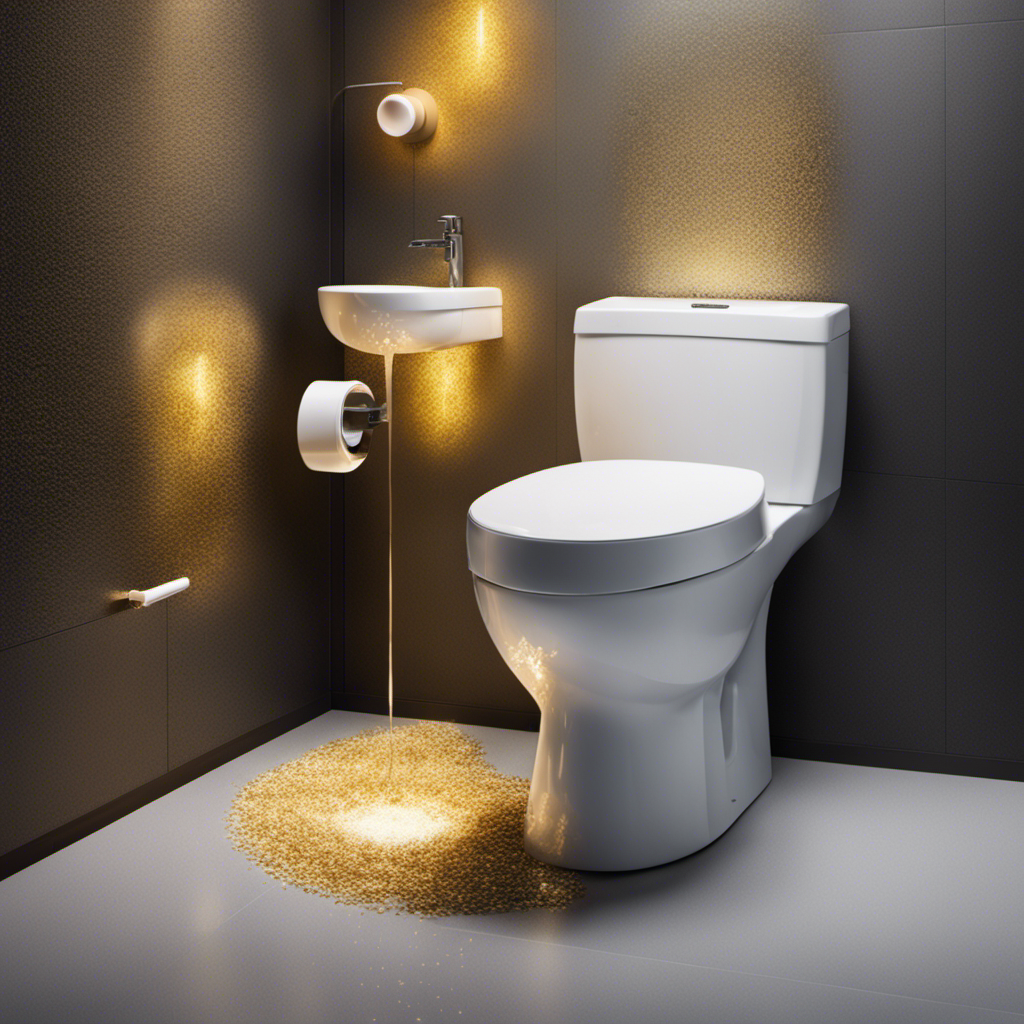Have you ever walked into your bathroom and been hit with a foul smell that resembles rotten eggs? Trust me, I’ve been there. It’s not only unpleasant, but it can also be a sign of a bigger problem with your toilet.
In this article, I’ll be diving into the possible causes of this stinky issue, explaining the role of bacteria in toilet odors, and providing you with effective solutions to eliminate the rotten egg odor for good.
So, let’s get started and banish that unpleasant smell from your bathroom!
Key Takeaways
- The rotten egg smell in a toilet can be caused by a build-up of sulfur bacteria in the pipes or sewer systems.
- Bacterial growth in the toilet bowl is a major contributor to the unpleasant smell, as bacteria release gases like hydrogen sulfide.
- Conducting a thorough toilet plumbing inspection and addressing potential plumbing issues can help eliminate the odor.
- Natural remedies like using baking soda with essential oils or a vinegar spray can be effective in eliminating the odor, while regular cleaning and disinfecting can prevent future odors and maintain freshness.
The Possible Causes of the Rotten Egg Smell
One of the possible causes of the rotten egg smell in your toilet is a build-up of sulfur bacteria in the pipes. These bacteria thrive in environments with low oxygen levels and high amounts of organic matter, such as those found in sewer systems. When waste and wastewater pass through the pipes, chemical reactions occur that release hydrogen sulfide gas, giving off that unpleasant odor.
This gas is commonly associated with the smell of rotten eggs. Understanding the role of bacteria in toilet odors is essential in finding effective solutions to eliminate or reduce the smell.
Understanding the Role of Bacteria in Toilet Odors
To understand why your toilet has a foul odor, it’s important to recognize the role bacteria play in causing these smells. Bacterial growth is a major contributor to toilet odors. Bacteria thrive in warm, moist environments, and the toilet bowl provides the perfect conditions for their growth.
These bacteria release gases, such as hydrogen sulfide, which give off that rotten egg smell. However, it’s not just bacteria that are responsible for the odor; water quality also plays a significant role. If the water in your toilet contains a high level of sulfur or other impurities, it can contribute to the foul smell.
Additionally, hard water can lead to mineral deposits, which can create a breeding ground for bacteria. Therefore, improving water quality and regularly cleaning your toilet can help eliminate these unpleasant odors.
How to Identify and Fix Plumbing Issues Causing the Smell
If you’re experiencing a foul odor coming from your toilet, it’s important to identify and fix any plumbing issues that may be causing the smell. Here are three key steps to help you address the problem:
-
Conduct a thorough toilet plumbing inspection: Start by checking for any leaks or cracks in the toilet bowl or tank. Look for signs of sewage backup or clogged pipes as well.
-
Address potential causes: If the smell is reminiscent of rotten eggs, it may be due to a buildup of hydrogen sulfide gas. This can occur if there is a problem with the sewer vent or if the water in the toilet bowl is not properly aerated.
-
Consider professional odor removal services: If you’ve identified a plumbing issue but are unsure how to fix it, it’s best to consult a professional. They can provide expert advice and perform any necessary repairs or replacements to eliminate the odor for good.
Natural Remedies to Eliminate the Rotten Egg Odor
Using natural remedies can be an effective way to eliminate the foul odor in your bathroom that smells like rotten eggs.
There are several homemade air fresheners that you can try to combat this unpleasant smell.
One option is to mix baking soda with a few drops of essential oil, such as lemon or lavender, and place it in a small dish in your bathroom. Baking soda is known for its ability to absorb odors, while the essential oils will provide a fresh scent.
Another option is to create a vinegar spray by mixing equal parts white vinegar and water in a spray bottle. Vinegar has natural deodorizing properties and can help eliminate the odor-causing bacteria. Simply spray the mixture in the air or directly onto surfaces in your bathroom to freshen up the space.
These natural remedies can be a cost-effective and eco-friendly way to eliminate odors in your bathroom.
Preventing Future Toilet Odors and Maintaining Freshness
Maintaining freshness in your bathroom can be achieved by regularly cleaning and disinfecting the toilet bowl. This simple task not only keeps your bathroom smelling fresh, but also helps to prevent the buildup of germs and bacteria.
Here are three key ways to keep your toilet clean and fresh:
- Use a toilet brush and cleaning solution to scrub the inside of the bowl, paying special attention to the rim and under the rim where bacteria can accumulate.
- Consider using a toilet cleaner that contains bleach or other disinfecting agents to ensure a thorough clean.
- In addition to regular cleaning, you can also use air fresheners specifically designed for toilets to keep your bathroom smelling pleasant.
Frequently Asked Questions
Can the Rotten Egg Smell in My Toilet Be Caused by Something Other Than Plumbing Issues?
Other causes of a rotten egg smell in the toilet can include a dry trap, sewage backup, or bacteria growth. It’s important to identify the root cause. Natural remedies like cleaning with vinegar or baking soda can help eliminate the odor.
Is It Safe to Use Chemical-Based Cleaners to Eliminate the Rotten Egg Odor in My Toilet?
Using chemical-based cleaners may temporarily mask the smell, but it’s not the best solution. Natural remedies, like vinegar or baking soda, are safer and more effective in eliminating the rotten egg odor in your toilet.
What Are Some Common Mistakes People Make When Trying to Fix Plumbing Issues Causing the Rotten Egg Smell?
Common mistakes when trying to fix plumbing issues causing the rotten egg smell include ignoring the root cause, using temporary solutions, and not properly ventilating the bathroom. Effective solutions involve identifying and fixing the source of the odor, cleaning the toilet thoroughly, and ensuring proper ventilation.
Are There Any Health Risks Associated With the Bacteria That Cause the Rotten Egg Smell in Toilets?
Are there health risks associated with the bacteria causing the rotten egg smell in toilets? Learn about prevention methods to keep your family safe from potential illnesses caused by these foul odors.
How Often Should I Perform Maintenance on My Toilet to Prevent Future Odors and Maintain Freshness?
I perform regular toilet maintenance to prevent odors and maintain freshness. It’s important to clean the toilet bowl and tank at least once a week, and to check for any leaks or issues that may contribute to unpleasant smells.
Conclusion
In conclusion, discovering the source of that dreadful rotten egg smell in your toilet is crucial for a fresh and pleasant bathroom experience. By understanding the role of bacteria and identifying plumbing issues, you can effectively eliminate the odor.
Implementing natural remedies and practicing preventive measures will ensure a long-lasting freshness. So, don’t let your toilet become a breeding ground for foul odors, take action now and enjoy a clean and inviting bathroom.
Remember, a little knowledge and maintenance can go a long way.









